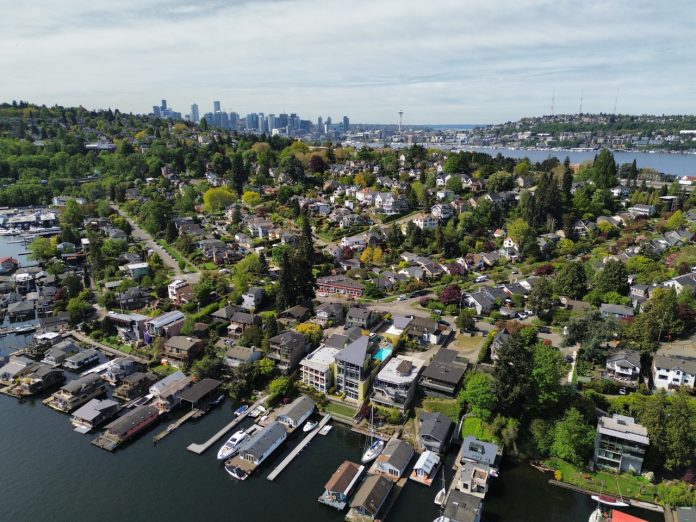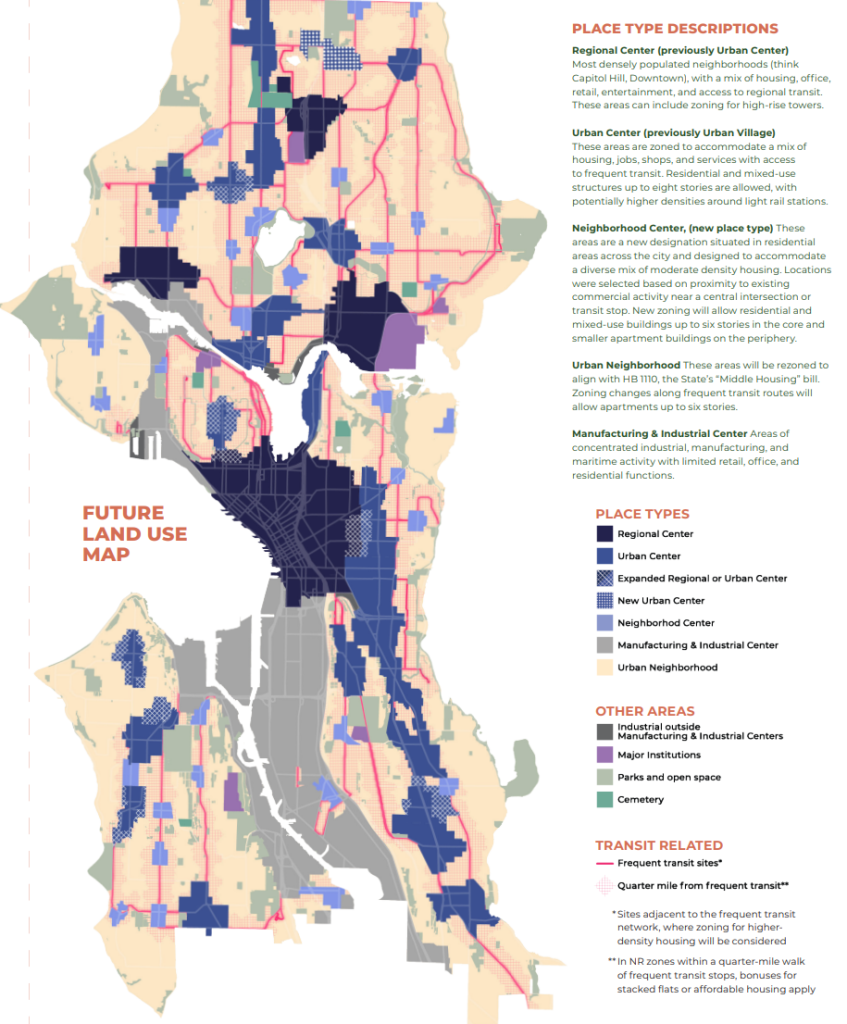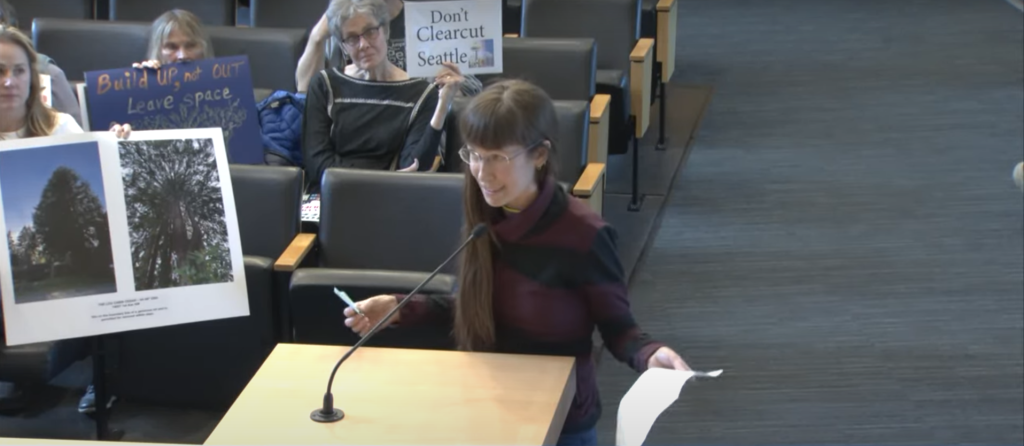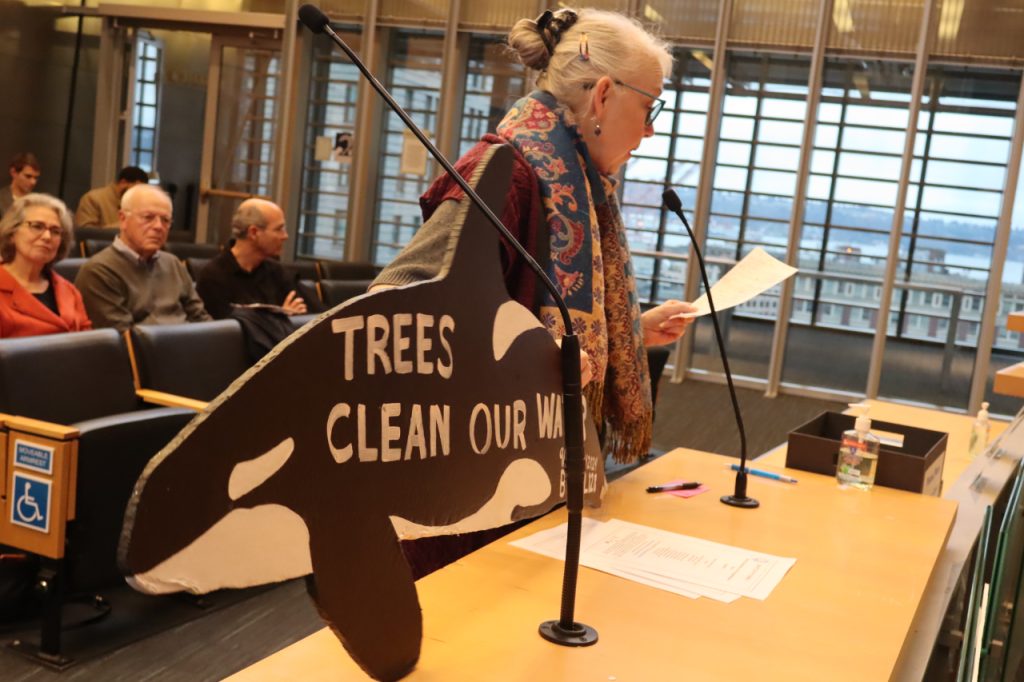
A King County Superior Court Judge this month denied two separate requests for writs of review filed by opponents of Mayor Bruce Harrell’s One Seattle Comprehensive Plan. As last-ditch attempts to reopen the issue of whether the City of Seattle’s environmental review of planned citywide zoning changes was thorough enough, this denial shuts a final door that two of the initial six groups of appellants attempted to reopen, after all of those appeals were dismissed last month.
Those appeals, filed ahead of a deadline in February, had been resolved within two months, a testament to relatively recent state laws intended to cut down on predatory attempts to stall badly needed housing construction. But that short delay did ultimately result in pushing Seattle’s most impactful zoning changes into 2026, and additional review of the plan’s Final Environmental Impact Statement (FEIS) forced by a court could have added even more delay on top of that.
The two appellants, in separate filings as Jennifer Godfrey, and Friends of Ravenna-Cowen and John Cary jointly, argued that even though the state legislature recently took steps to make local plans for additional housing exempt from the State Environmental Policy Act (SEPA), that they should nonetheless be allowed to litigate the details of the City of Seattle’s environmental review in front of a judge. None of the initial six appeals reached that stage with Seattle’s Hearing Examiner, who is tasked with reviewing land use appeals.
But Judge Michael Scott disagreed, telling both parties that they will have an opportunity to litigate their issues — once the Seattle City Council takes action on the plan, expected later this year.

While the FEIS lays out the potential impacts of various zoning changes, nothing guarantees that those changes will be enacted. Case in point: despite releasing proposed zoning maps showing the extent of proposed changes to Seattle’s urban centers and new neighborhood center growth hubs, new maps obtained by The Urbanist and published last week show dramatic reductions in those centers, much to the disappointment of housing advocates.
Godfrey, whose appeal has focused on potential impacts of the housing growth plan on Puget Sound’s population of Southern Resident killer whales, is being represented by Toby Thaler, a familiar face when it comes to legal appeals against housing in Seattle. In 2017, Thaler led the legal charge against the city’s last major set of upzones, adding capacity to existing urban centers as part of the Mandatory Housing Affordability (MHA) program. In the interim, he served as a legislative aide for Councilmember Alex Pedersen, who proposed his own anti-growth growth plan alternative in 2022.

In the second filing, Friends of Ravenna-Cowen and John Cary were represented by Mount Baker resident Chris Youtz, who had himself submitted one of the six appeals filed this spring along with those other two parties. That appeal conflated the additional housing capacity included in One Seattle Plan — an increase of 120,000 units — with the city’s new total capacity for housing after the plan is adopted, around 330,000 units. That error has carried through to the appeal at King County Superior Court, despite a correction from the city’s Office of Planning and Community Development (OPCD) at every stage.
“The announcement that the city zoning capacity would be doubled, combined with the map showing the actual zoning now being proposed, created substantial controversy,” Youtz’s petition from this month stated, despite the fact that plan in fact never doubled. “Despite the dramatic increase in housing units announced months earlier, the FEIS contains no mention—let alone analysis—of the plan’s expanded scale. The FEIS kept intact the target of 120,000 housing units, despite the announced increase in zoning capacity in October.”
At Thursday’s brief hearing, Youtz repeatedly referenced a “right” to be able to challenge an environmental impact statement even when the legislature provided a safe harbor for housing legislation intended to comply with state mandates.
“You have the right when there’s a Final EIS issued, and if the city permits it, which it does here, to get a review of that statement prior to any decision,” Youtz said. “That’s an express right provided by SEPA and by the City. And by saying, no, you have to wait until there’s a decision made anyway, you’ve totally taken away that right.”
Thaler’s petition, on the other hand, utilizes a different argument to advocate for the same thing, asserting that the exemptions that the legislature adopted to limit appeals don’t apply because the council hasn’t taken final action on the plan yet. “Until the City Council votes to adopt OPCD’s proposed One Seattle Plan or implementing development regulations (with the Mayor’s required approval or a Council veto override vote) there is nothing for the statutory SEPA appeal exemptions to apply to,” Thaler’s filing stated.

Neither argument held water with Judge Scott, who issued decisions in both cases denying requests for review. He pointed to the fact that after the plan is adopted, any appellants can take up issues with the plan with the Growth Management Policy Board, a process explicitly spelled out in the 1990 Growth Management Act. Appeals like that have been utilized by groups like Futurewise, in attempts to push local governments to allow more urban growth, along with anti-development groups trying to stifle that growth.
“If the council takes action and say […] you acted on a flawed analysis, therefore the policy is flawed, and you have first administrative appeals, and if you’re not satisfied where you’ve been wronged there and might have appealed to superior court, but this is very early on for a court to insert itself,” Scott told Youtz.
“Statutory writs of review are extraordinary remedies, and they are to be granted sparingly and only when there’s no adequate remedy in law unless there’s kind of facial evidence of some sort of wrongdoing or illegal activity,” Scott said in issuing his initial decision orally from the bench.
Thaler has already filed a request for their petition to be reconsidered, but the quick dismissal of both filings suggest that these are doors that will remain closed, at least until the final plan is adopted. Update (5/28): Thaler’s motion for reconsideration was denied Tuesday, appearing to close off any additional avenues for appeal.
Ryan Packer has been writing for The Urbanist since 2015, and currently reports full-time as Contributing Editor. Their beats are transportation, land use, public space, traffic safety, and obscure community meetings. Packer has also reported for other regional outlets including BikePortland, Seattle Met, and PubliCola. They live in the Capitol Hill neighborhood of Seattle.

